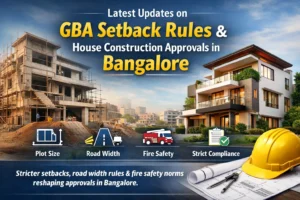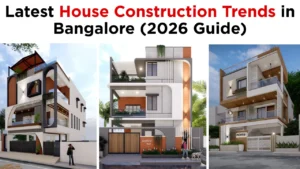
Checklist for House Construction in Bangalore
For many, building a house in Bangalore is more than just a project—it’s a lifelong dream. Turning that dream into reality, however, requires meticulous planning, the right approvals, and a reliable team. From verifying land documents to securing BBMP/BDA permissions Checklist for House Construction in Bangalore, budgeting wisely, and ensuring compliance with local building regulations, every step matters.
Whether you’re a first-time builder or upgrading your current home, this guide will help you avoid costly mistakes and build with confidence.
What is the complete checklist for house construction in Bangalore
A complete checklist for house construction in Bangalore starts with proper budget planning. This involves creating a clear spending plan based on your income, expected expenses, and construction priorities. Effective budgeting helps you stay in control of your finances, avoid unnecessary overspending, and achieve your construction goals smoothly.
To keep your project cost‑efficient, consider smart material and design choices:
Choose modular kitchen units instead of fully custom carpentry to reduce labour time and cost.
Use local granite rather than imported marble for a durable yet budget‑friendly finish.
Opt for fly ash bricks, which are economical, eco‑friendly, and widely used in Bangalore construction.
Legal & Regulatory Approvals for house construction in Bangalore
Encumbrance Certificate (EC)
Mother Deed
RTC (Record of Rights, Tenancy and Crops)
Hire a legal expert—don’t skip this!
Khata Certificate and BDA/BMRDA Approvals
A Khata is like your land’s birth certificate. Without it, getting loans or approvals is a nightmare. Ensure your land is BDA (Bangalore Development Authority) or BMRDA approved.
BBMP Plan Approval & Building Permits
The Bruhat Bengaluru Mahanagara Palike (BBMP) must approve your building plan. Submit:
Site plan
Floor plan
Elevation
Structural design
Site Selection and Soil Testing
Choosing the Right Location
Ask yourself:
Is it close to your workplace?
How’s the water table?
Are there zoning restrictions?
Whitefield, Sarjapur Road, and Kanakapura Road are hot right now.
Soil Testing and Topography Analysis
Clay soil? Rocky land? These affect foundation depth and cost. Soil testing tells you what you’re working with—and can prevent future structural issues.
Choosing the Right Architect & House Contractor in Bangalore
Your architect should be registered with the COA (Council of Architecture). House Contractors must have experience in your type of house construction
Signing Proper Contracts
Don’t rely on handshakes. Your contract should cover:
Payment terms
Completion dates
Penalties for delays
Warranty on work
House Constrcution Design & Planning
Whether you’re spiritual or just practical, Vastu principles like placing the kitchen in the southeast and bedrooms in the southwest are common in Bangalore homes.
Space Optimization & Modern Trends
Think:
Open floor plans
Multi-purpose furniture
Smart storage under stairs
House Construction Materials & Procurement
Sourcing Materials Locally
- Local vendors in areas like KR Market or Hosur Road offer better deals. Buy in bulk to save costs.
Budget vs. Quality Balance
- Cement, TMT bars, and sand should be ISI certified. Don’t compromise here—even if you’re trying to save money.
Step-by-Step Guide to House Construction Phases
Foundation Work
- From excavation to laying the concrete slab—this is where your home takes root.
Structural Work
- Pillars, beams, and walls come next. Monitor quality strictly during this phase.
Electrical & Plumbing
Plan for:
Extra sockets
Solar wiring
Water purifier pipelines
Finishing & Interiors
This includes:
Flooring
Painting
Kitchen and wardrobes
Budget overruns often happen here. Be vigilant!
Safety and Labour Compliance
Hiring Licensed Labor
- Avoid unskilled labor. Hire through registered contractors who follow labor laws.
Ensuring Site Safety
- Use safety helmets, warning signs, and barricades. Don’t cut corners with safety.
Utility Connections and Services
Water Supply & Borewell
- Get a borewell dug if no municipal water is available. Also, apply early for BWSSB connection.
Electricity & Sewage Systems
- Apply for BESCOM connection. Check sewage disposal—many outer Bangalore areas still use septic tanks.
Environmental Considerations
Rainwater Harvesting
- Mandatory in most BBMP areas. Plan the system during the early design stage.
Solar Energy and Sustainability
- Rooftop solar panels are subsidized. Consider greywater recycling and eco-friendly paints too.
Timeline and Project Management
Setting Realistic Timelines
- A 2,000 sq. ft. home typically takes 9–12 months. But rain, labor strikes, and material delays can extend this.
Avoiding Common Delays
Pre-order fixtures
Make decisions on interiors early
Don’t keep changing plans
Final Inspections and Handover
- Do a final walk-through with your contractor. List unfinished or incorrect work and get it fixed before handover.
Occupancy Certificate and Registration
- BBMP provides an Occupancy Certificate (OC). Only then should you legally occupy the house. Don’t forget to register the property at the sub-registrar office.
Conclusion:
A house construction in Bangalore checklist is more than just bricks and mortar—it’s a journey that demands foresight, planning, and the right team. From verifying land titles and securing BBMP/BDA approvals to budgeting, hiring professionals, and adhering to Vastu or sustainability norms, every step plays a pivotal role in shaping your dream house
FAQ
Checklist for House Construction in Bangalore
Typically, it takes 9–12 months, depending on design complexity and contractor efficiency in-house construction.
Absolutely. It helps determine foundation type and prevents future structural problems.
The cost ranges from ₹1,800 to ₹3,500 per sq. ft., depending on materials and design.
It’s not mandatory, but many homeowners follow it for cultural and resale value reasons.
After construction completion and compliance with all BBMP regulations.





